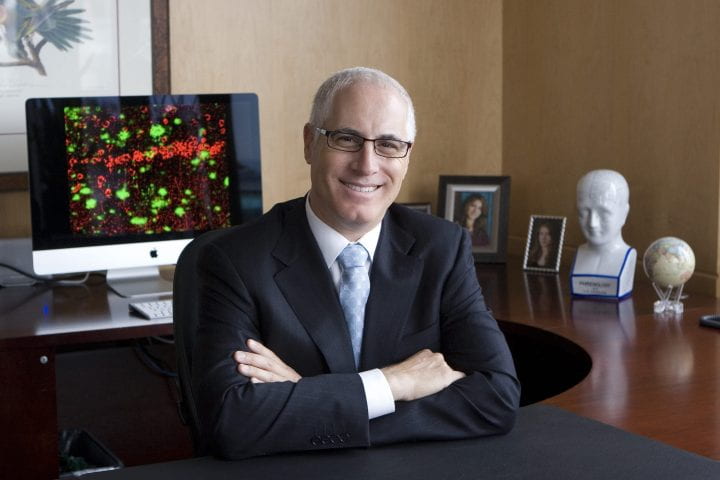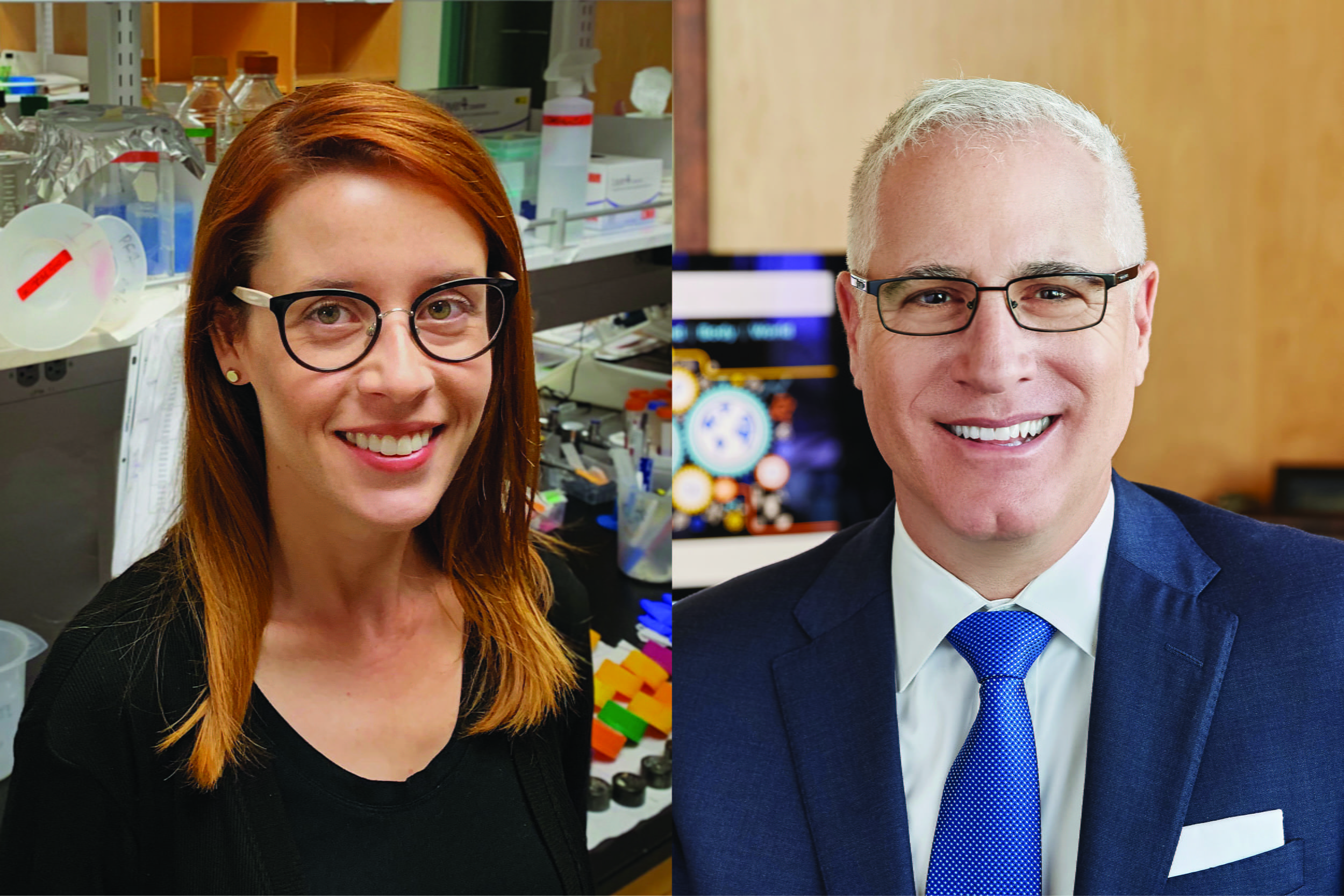Coping with memory impairment during the holidays
School of Biological Sciences Dean Frank La Ferla offers advice for family members

In this episode of the UCI Podcast, Frank LaFerla, Chancellor’s Professor and dean of the School of Biological Sciences, discusses the difficult situation many families face when reuniting during the holidays with someone with cognitive impairment because of Alzheimer’s disease or another neurological condition.
To get the latest episodes of the UCI Podcast delivered automatically, subscribe at:
Apple Podcasts – Google Podcasts – Stitcher – Spotify
Transcript
From the university of California, Irvine, this is the UCI podcast. I’m Brian Bell.
For people around the world. The holidays are a time, are joyful reunions with family and friends. For some that means getting together with relatives who are suffering with dementia caused by Alzheimer’s disease or other neurological conditions. How do people cope with the changes taking place with their aging loved ones? What can they expect over the holidays?
Frank LaFerla, Chancellor’s Professor and dean of UCI’s School of Biological Sciences has put a lot of thought into questions like these. In this episode of the UCI Podcast, he shares some advice on how to make the best of a difficult situation during this season of togetherness. Our conversation is up next.
Dean Frank LeFerla, welcome to the UCI Podcast.
Thank you very much. Great to be here.
We’re here today to talk about the special situation that families experience when their loved ones have dementia or Alzheimer’s during the holidays and how that impacts families and how that impacts people who actually are suffering from these conditions. So I want to start with a scenario of a family whose father was diagnosed three years ago with Alzheimer’s. They haven’t seen him in person in a couple of years, perhaps because of the pandemic separation, the lockdown, et cetera. And so, what can they expect after not having seen their father in the past couple of years?
Great question. So, first of all, the holidays could be stressful for even people who are not cognitively impaired. But it’s difficult to pinpoint precisely, because everyone with Alzheimer’s progresses at a different rate. There’s no set path by which someone with a disease that you could pinpoint that they’ll be at this certain three years out. There are certain individuals who have mild Alzheimer’s disease that might remain at that level for prolonged period of time. And then there are others who might progress very rapidly and go from mild to severe in a relatively short period of time. So it’s really difficult, I think, to pinpoint that with any precision, with any degree of certainty,
There’s another scenario where somebody whose grandmother has Alzheimer’s, she can’t go out for a walk by herself because she’ll get lost now. Can somebody from the family take her out for a walk during the Christmas celebration.
Absolutely. That’s such great thing to do. As a matter of fact, we often recommend that you escort someone with Alzheimer’s on a walk for a variety of reasons, not the least of which is that the physical activity can be beneficial, but so is that socialization and that engagement you get when you go along with them. So it’s a, it’s thought to be a good thing to actually take someone out on a walk.
We’ve really been obsessed with the pandemic over these past couple of years, thinking about vaccines and treatments for COVID 19 and how we as a society are dealing with these issues. Has that put Alzheimer’s research onto the back burner, so to speak?
Not for Alzheimer’s researchers, Alzheimer’s researchers are still working out there, and there’s a lot of activity looking at what impact COVID might have on Alzheimer’s. Some of that’s being conducted here at UCI by my colleague, Professor Tom Lane, for example, investigating that. I always tell people that Alzheimer’s was certainly the most significant medical problem before COVID and once COVID dies down, it will resume being the most significant medical issue that we face as a society.
I’ve seen that COVID 19 is impacting elderly Americans on a much higher percentage. Is Alzheimer’s considered a comorbidity with COVID 19.
Yeah. So age is an important risk factor for for COVID 19, but also for Alzheimer’s, as well. And I think part of the reason is that your immune system just doesn’t work as well as it did when you’re younger.
Why is Alzheimer’s considered a cause of death?
It’s now considered a cause of death. It didn’t used to be for individuals who had Alzheimer’s disease. If they died from, let’s say pneumonia, they would previously had listed pneumonia as the cause of that. But now if someone dies with Alzheimer’s, we now list that as individual passing with Alzheimer’s disease. And I think that’s important recognition and it doesn’t underestimate the number of individuals in our society that are really impacted by this dementia.
Alzheimer’s impacts elderly people, elderly people are also prone to fall. They can harm themselves through a fall and ultimately become hospitalized because of a fall. And in many cases that may exacerbate their Alzheimer’s condition. Do you feel that a hospitalization is kind of a risky situation for somebody with Alzheimer’s?
Yeah, I think it’s risky for a variety of reasons. Number one is it does add a lot of stress, and we know that stress could be a significant comorbidity for Alzheimer’s disease and can really accelerate that. Hospitalizations are also a good place to pick up other infections. So that also creates other challenges. Your socialization is definitely limited in a hospital situation. So I think there’s a number of reasons why hospitalizations cause people to decline. Yeah.
I guess if somebody is in a hospital too, they’re separated from family for a significant amount of time. And do you, do you think that that Alzheimer’s suffers benefit from having more, uh, family exposure time?
Yeah. In general Alzheimer’s patients like being around familiar environments, they don’t do well when you take them out of a familiar environment. So I think that might be part of the reason why they like being around family.
What can we do to prevent Alzheimer’s or slow down its progression?
Yeah. That this is a question that comes up quite a bit. Everyone wants to know what they can do to slow or prevent Alzheimer’s disease. And there’s really no magic bullet, except that we do know that eating healthy, getting regular physical activity, staying cognitively engaged of not drinking too much, not smoking. And I would also add, socialization, maintaining your social networks. Those are very important things that can help at least slow down the course.
Do you think there will ever be a pharmaceutical cure to Alzheimer’s?
I don’t think there will be a single pharmaceutical cure, whether or not there’s a cocktail of multiple treatments. And it’s an interesting question that you ask, because when you say a cure, does that mean being able to restore someone’s brain to what it was, how it was functioning 10 or 15 years before the diagnosis? I don’t think so. I think at least for the immediate future, the best that we might be able to do is prevent someone from declining further and to just stabilize them.
Is there any other advice you would offer to people who are visiting with loved ones with Alzheimer’s during the holiday season?
I think most significant thing that I can tell them is to remember that Alzheimer’s patients don’t decline in a straight line, and their cognitive abilities fluctuate. It’s kind of like a seismic plot and this causes a lot of grief and stress for the family members, because one day their loved one will remember who they were and they will seem almost perfectly normal. And then the next day won’t even remember who their son and or daughter is, and that causes a lot of stress for the family members. And it’s almost like the person with Alzheimer’s is pretending, but of course they’re not. So I think that is something that individuals have to accept. And I would say maybe the other thing is I always advise family members to do what the airlines tell you to do: Put your mask on before you help others put on theirs. Because if you don’t take care of yourself, you’re never going to be able to take care of someone who’s suffering from Alzheimer’s.
It seems like it requires a lot of patience and compassion.
It absolutely does. This is a disease that you’re in for the long haul and unfortunately causes a lot of stress for the caregivers.
Well, Dean La Ferla, I wanna thank you for joining us today on the UCI Podcast and happy holidays to you.
Thank you. Happy holidays to you. And thank you for having me.
You can learn more about research into Alzheimer’s disease, dementia and memory impairment at mind.uci.edu. The UCI Podcast is a production of Strategic Communications and Public Affairs at the University of California, Irvine. I’m Brian Bell. Thank you for listening and happy holidays.





